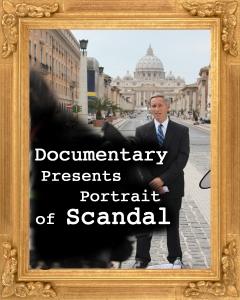By Kevin Noonan
The Observer
September 13, 2010
http://www.ndsmcobserver.com/scene/documentary-presents-portrait-of-scandal-1.1594405
 |
In his upcoming documentary, "What the Pope Knew," CNN national correspondent Gary Tuchman takes an unflinching and in-depth look into one of the most controversial scandals in the history of the Catholic Church — pedophilia in the priesthood.
Tuchman is specifically interested in attempting to discover how current Pope Benedict XVI, formerly Cardinal Joseph Ratzinger, handled this scandal in his positions of power as Bishop and later as Cardinal.
The documentary is, at the least, unsettling. From a filmmaking standpoint, one of its strongest attributes is that Tuchman, in journalistic style, does not offer opinion or analysis, but merely uncovers information and leaves his audience to draw their own conclusions. But the information presented is far from flattering for the Pope.
As the Prefect of the Sacred Congregation of the Doctrine of the Faith, a position he held in the discipline office of the Vatican from 1981 until he was elected Pope in 2005, he often dragged his feet and delayed punishments and defrocking for pedophile priests.
Adding to the frustration of victims, Ratzinger was anything but sluggish in dealing with priests who strayed from the doctrines of the Church. The documentary asserts that the Cardinal was swift in rebuking priests who discussed controversial topics in any different perspective than that expressly approved by the Vatican.
And even though the Vatican has made significant progress in the last decade in the handling of these scandals, it still falls short in the eyes of many.
Despite the extensive amount of negative information presented in the documentary, Tuchman does not allow his film to become a biased attack on the Pope or the Catholic Church. He allows the Vatican, via Monsignor Charles Scicluna, the Vatican's prosecutor, to defend every accusation.
The documentary also looks into the transformation of the Church's handling of sex abuse cases, spearheaded by Ratzinger. At the turn of the century, the Cardinal, frustrated with the red tape and restrictions placed on his power to discipline pedophile priests, pushed for and received changes in policy that allowed him to more effectively bring about justice in these cases. And as Pope, he has made it a point of emphasis to deal with the controversy head-on.
"Everyone acknowledges that Pope Benedict is doing a lot more now than any other Pope has done before him," Tuchman said in an interview with The Observer. "He's had meetings with victims, public apologies for what's happened. But back … when he was the head of the Congregation for the Doctrine of the Faith … there were many cases where … bishops wanted [known pedophile priests] defrocked, wanted them gone, and action was not taken in Rome."
The documentary very effectively balances its information and sources, which range from abuse victims to Vatican officials to objective analysts, and comes together to create a revealing picture of what has been done in the past and how the Church still needs to progress.
But with such a sensitive topic, and with interviews that at times are critical of the man who now leads one of the largest religions in the world, Tuchman is sure to be the target of some criticism himself. The fact that the Pope could not be interviewed for the documentary undermines its integrity to some degree, but since the Pope does not grant interviews, this was an unavoidable flaw.
And certainly, the constant repetition of dramatic background music may reveal, if not a slight amount of bias, at the least an unnecessary injection of tone to accentuate the controversy in the film. Tuchman insists, however, that this documentary was not intentioned as an accusation of wrongdoing by the Pope.
"We're dedicating this hour to the victims of child molesters, but … also very specifically to the hundreds of millions of faithful Catholic lay people and clergy," Tuchman said. "They deserve better than to have tiny portions of pedophile priests violate the human decency that this great religion stands for … That's why getting things out in the open is critically important."
As for the picture that the documentary itself paints of Pope Benedict XVI, perhaps David Gibson, the Pope's biographer, summed it up best.
"[Cardinal] Ratzinger was not and is not the villain of the sexual abuse crisis in the Catholic Church in no way, shape or form. Yet, he's not the hero either. He was part of the culture," Gibson said in the documentary.
Any original material on these pages is copyright © BishopAccountability.org 2004. Reproduce freely with attribution.